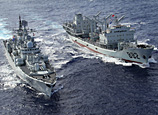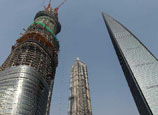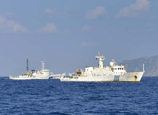
 |
| China.org.cn interviews Huang Youyi, vice president of China International Publishing Group (CIPG) as well as vice president of the Translators Association of China (TAC) at the National Conference on Translation held in Beijing, Dec. 6, 2012.(China.org.cn) |
The National Conference on Translation marking the 30th anniversary of the Translators Association of China (TAC) was held in Beijing on Dec. 6. The event was co-organized by China International Publishing Group (CIPG) and TAC.
During the conference, "The Report on 2012 China's Language Service Industry Development" was released by TAC and the Institute of China Transition Department.
According to the introduction by Guo Xiaoyong, executive vice president of CIPG as well as executive vice president of TAC, this is the first authority industry report released by the Chinese translation industry since the People's Republic of China was founded in 1949.
The report shows the annual output value of China's language service industry stood at 125 billion yuan (US$ 20 billion) in 2011, about 26 percent more than in 2010. The 2011-year-end statistic data show that number of employees active in the language service industry has now reached 1.19 million, including 640,000 translators - 53.8 percent of the total number.
According to the developing trend of the industry itself combined with external opportunities, China's language service industry will maintain a 15 percent annual increase during the 12th Five-Year plan (from 2011 to 2015). In 2015, turnover of companies based in the language industry is set to exceed 260 billion yuan, whereas the number of employees will hit 2 million.
The report also indicates that China's language service industry currently faces a number of problems, such as low threshold, lack of legal guarantee, small scale, low industry concentration and international participation.
China.org.cn interviewed Huang Youyi, vice president of CIPG as well as vice president of TAC. Huang explained how TAC has paid a lot of attention to industrial regulations and laws. He once represented TAC when submitting proposals to the National Political Consultative Conference, in an appeal to strengthen the market access and prevent any translation companies from entering the market without the suitable qualifications.
On the issue of making the rules of market access, TAC has also communicated with the National Administration for Industry and Commerce, but legal authority is necessary when creating any regulations in regards to market access, and right now there is simply no law related to translation. The legislative work must be accelerated to ensure the healthy and orderly development within the translation industry.
Tang Jiaxuan, former state councilor and honorary president of TAC, also indicated that any legislation requires a longer procedure, TAC needs to appeal and publicize continually in order to obtain more attention and support from all of society and in addition gradually create suitable legislative conditions for the formation of a market ruled by law.
Talking about how to solve the issues of translation industry scale dispersion and a lack of strong companies, Huang replied, "TAC always communicates with translation companies." Set against the backdrop of the so-called go global-strategy, the translation industry should seize opportunities and strengthen its talent team construction to promote the constant development of the whole industry.














 Spectacular images of erupting volcanoes
Spectacular images of erupting volcanoes


![]()
